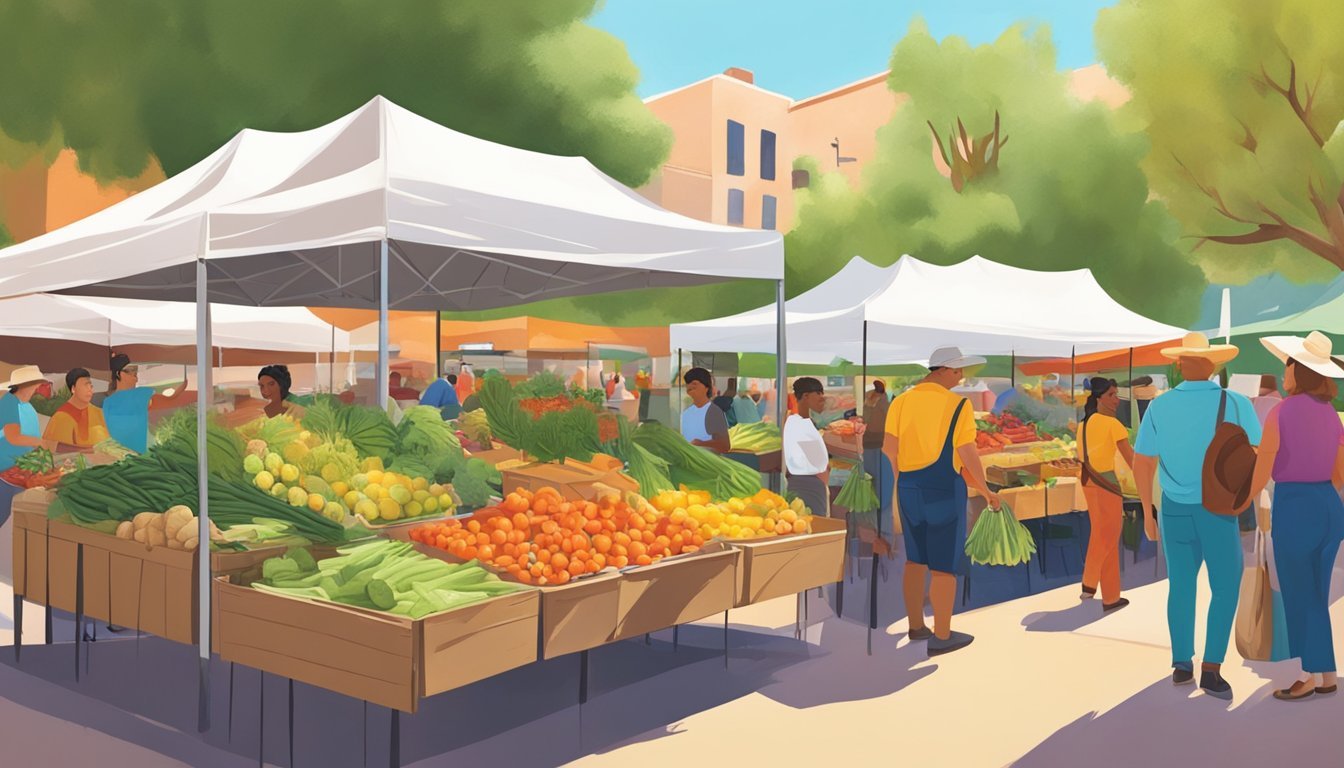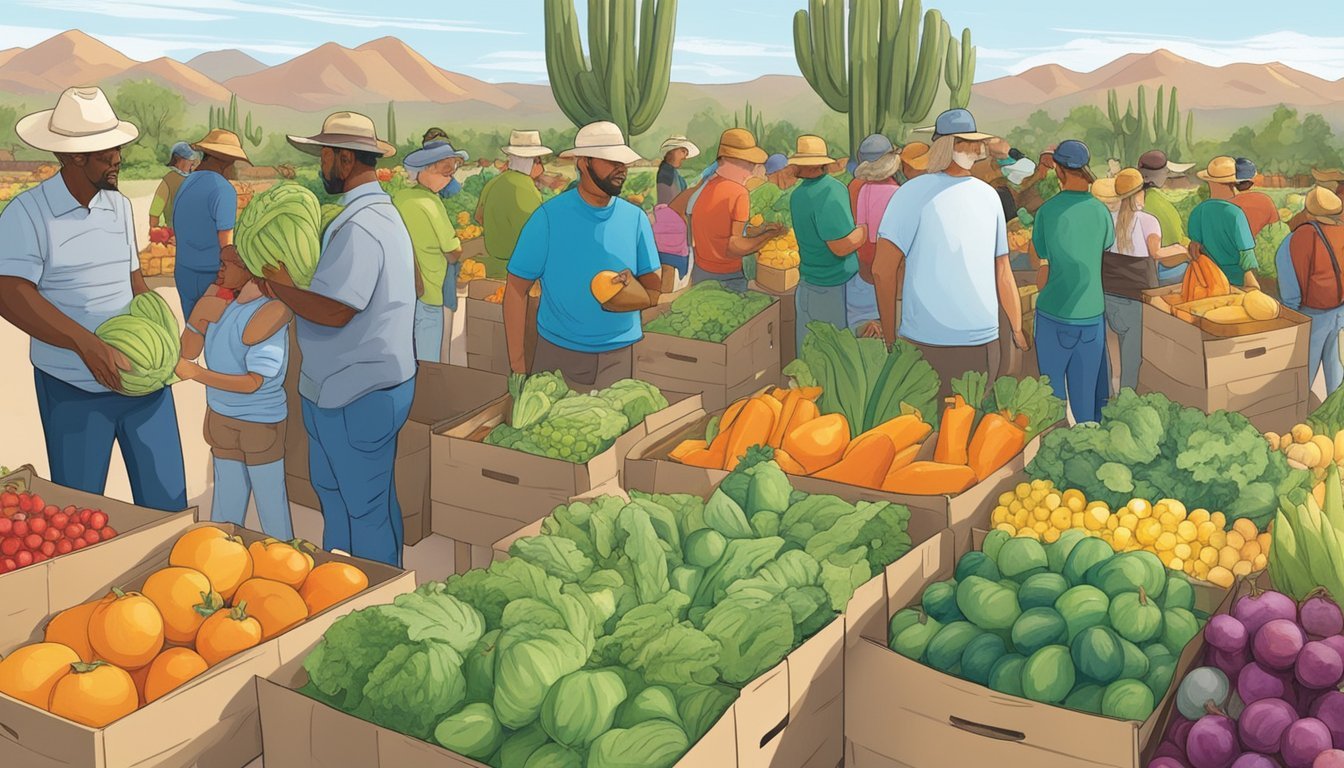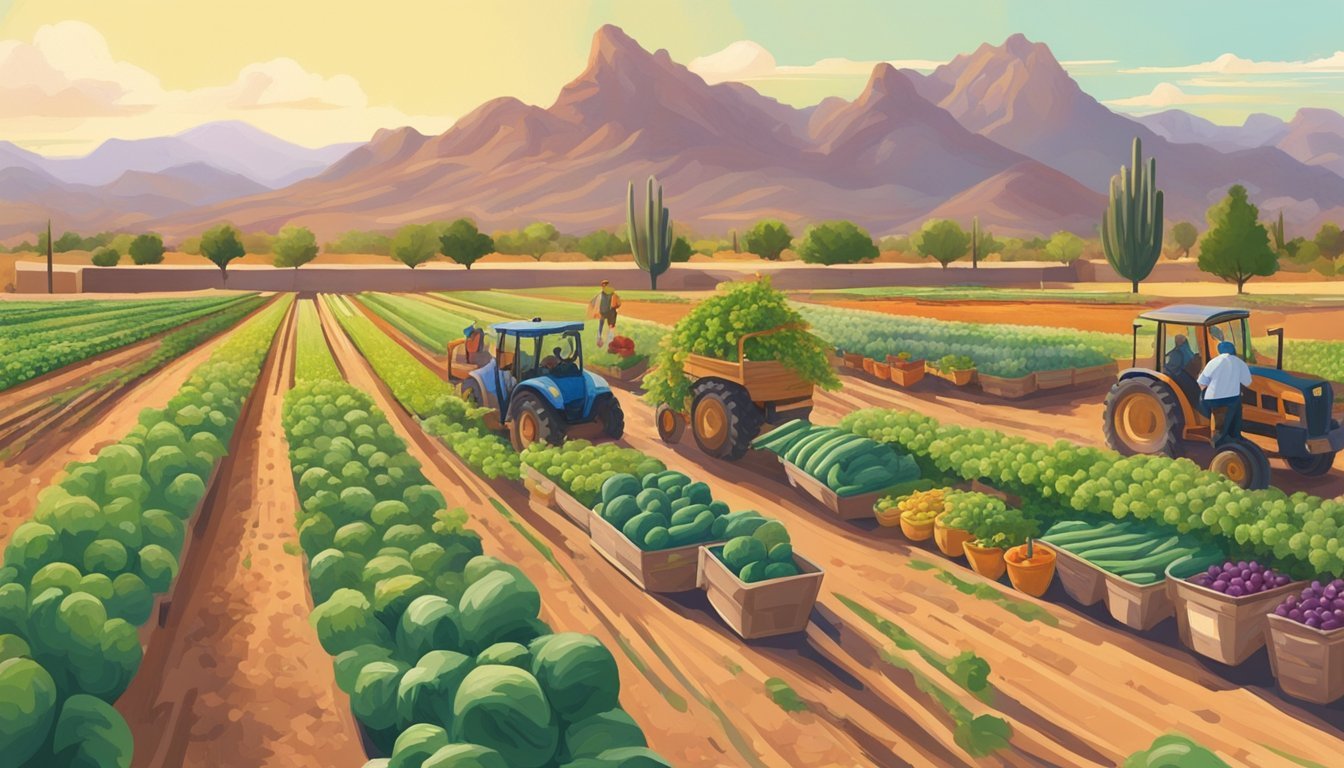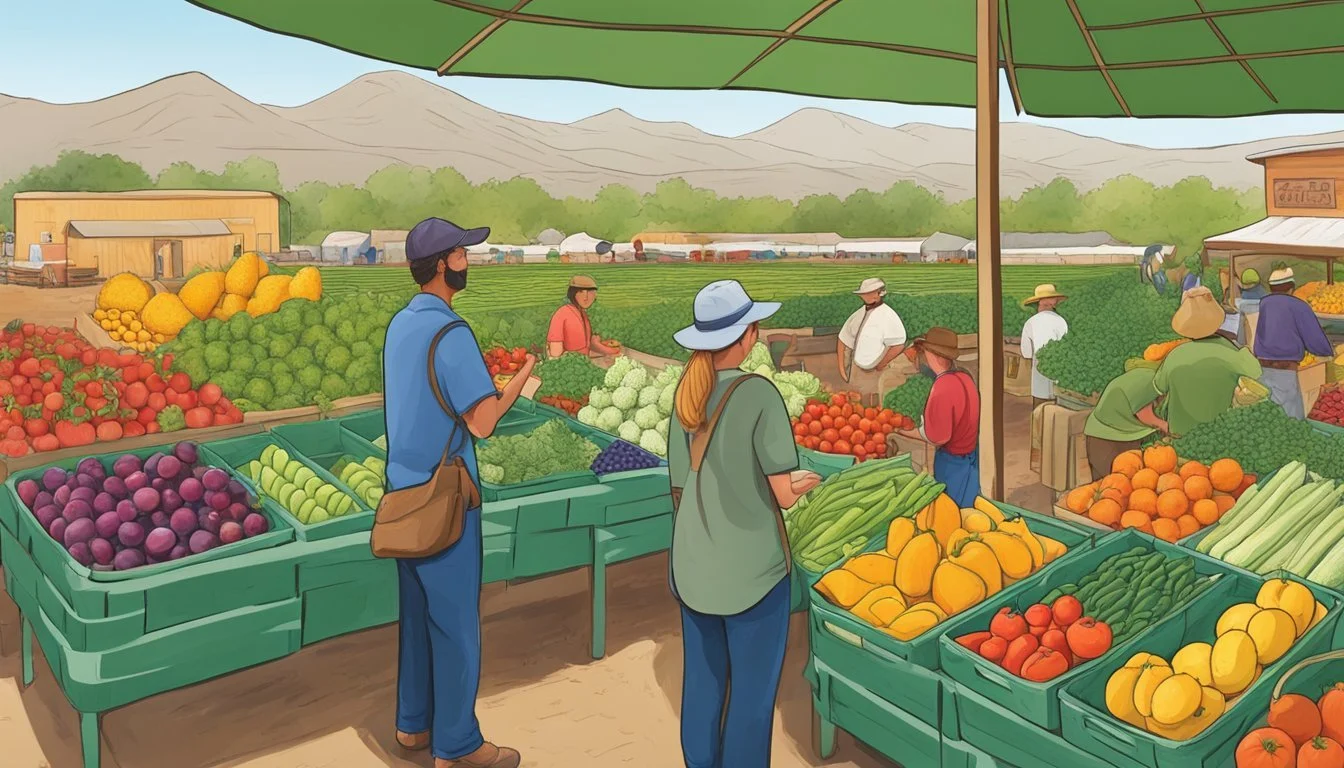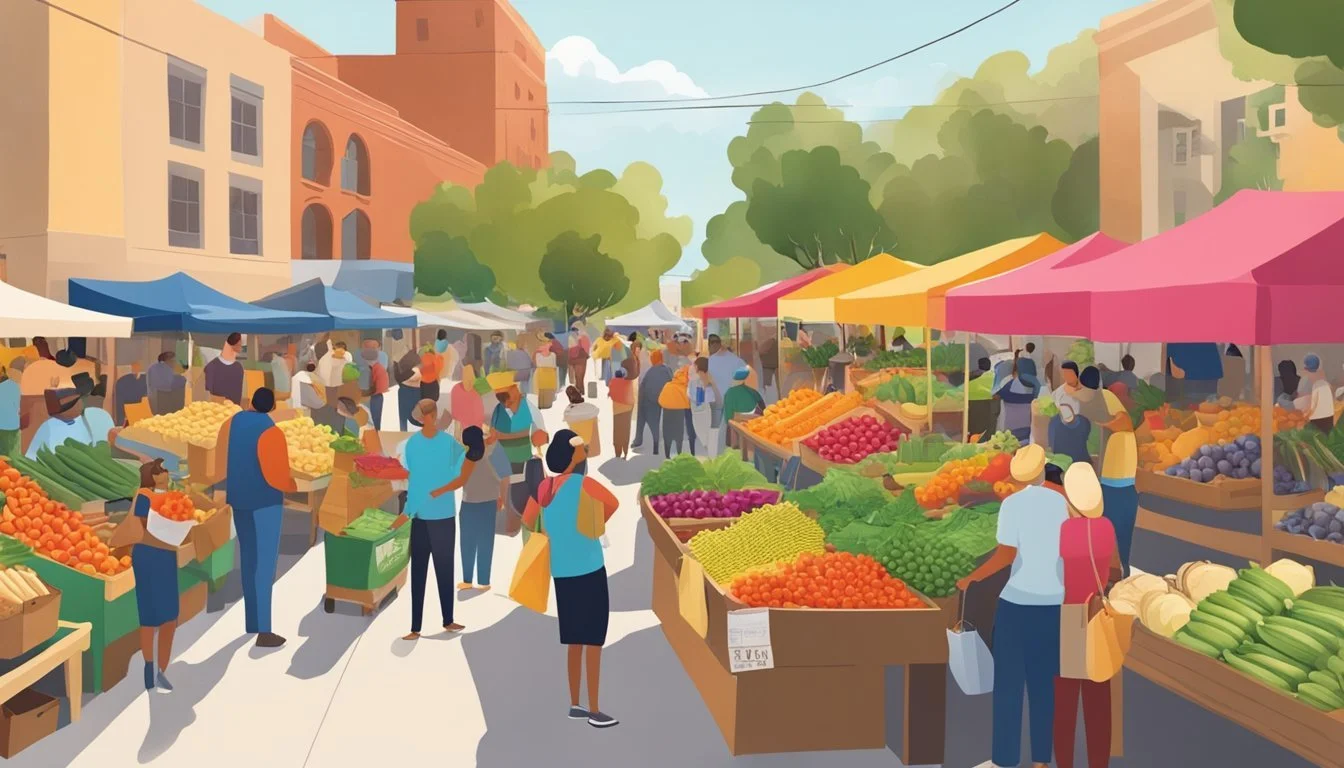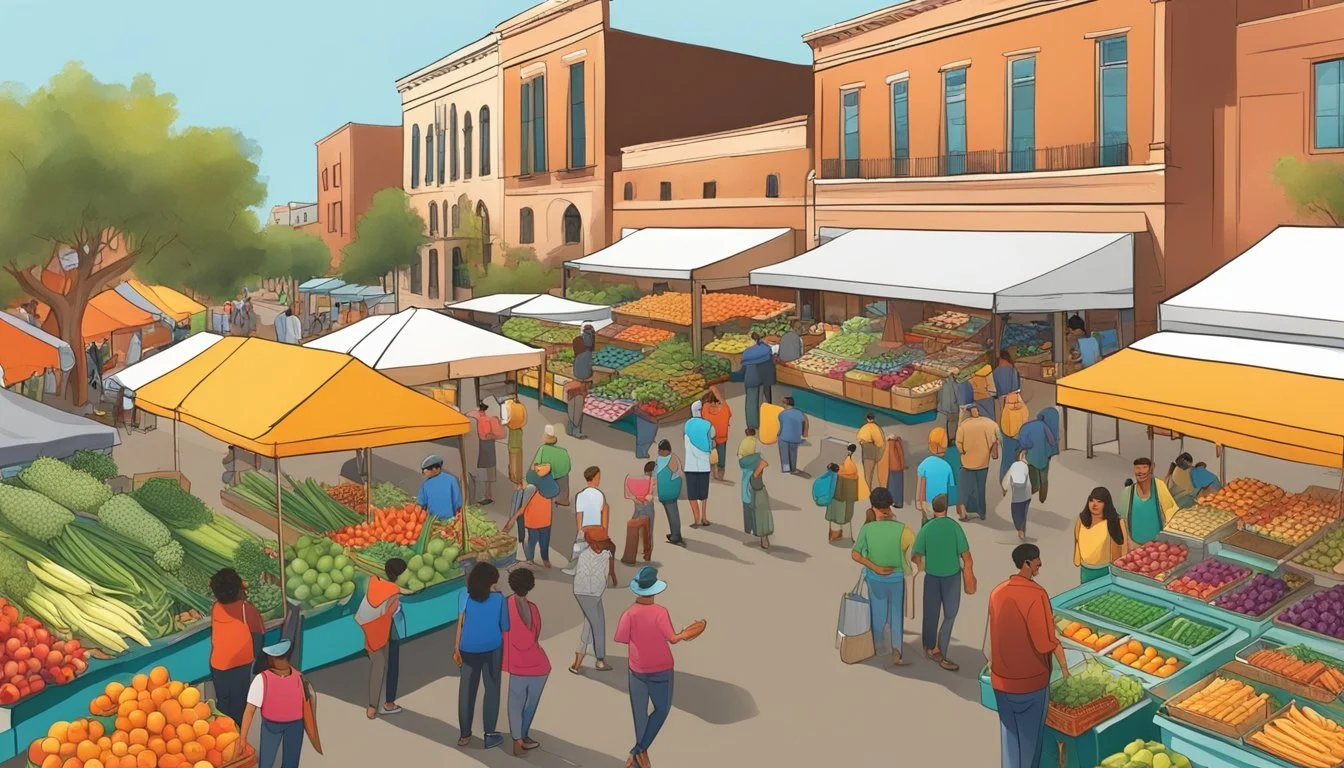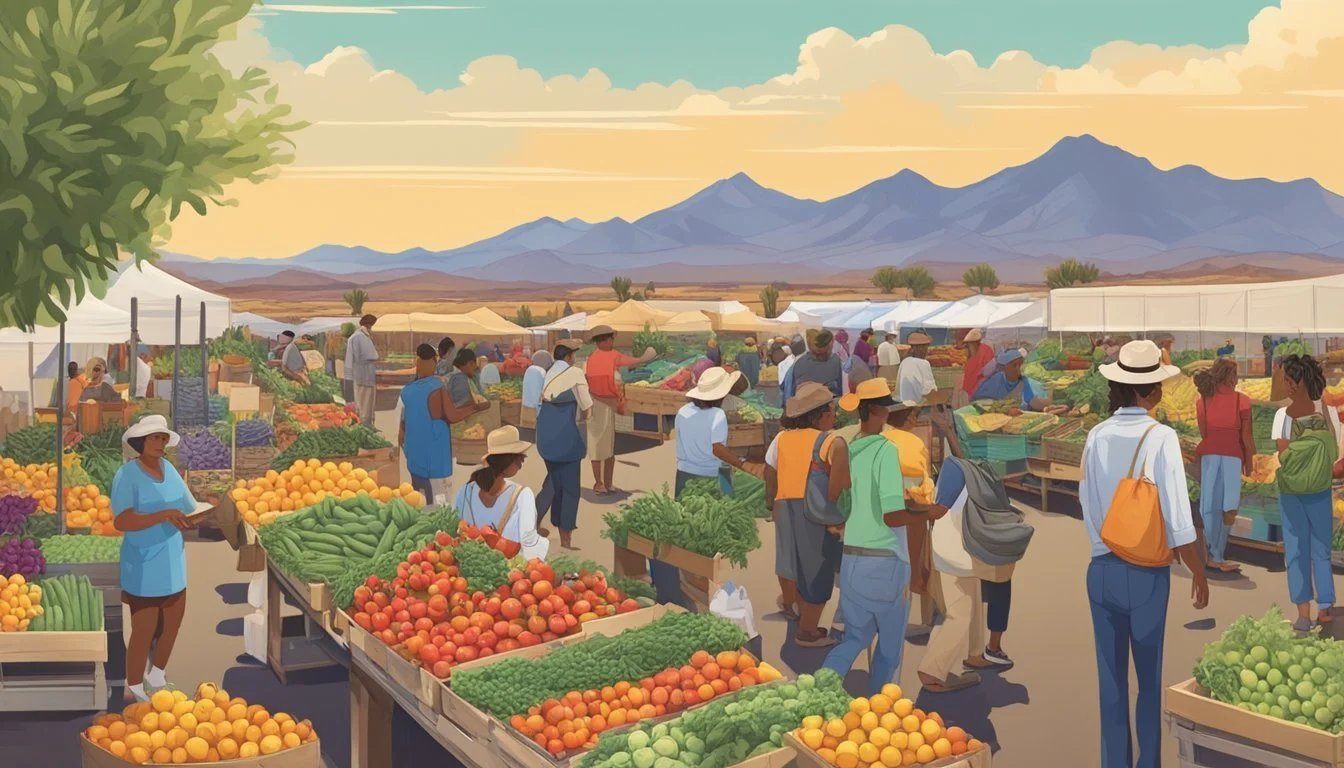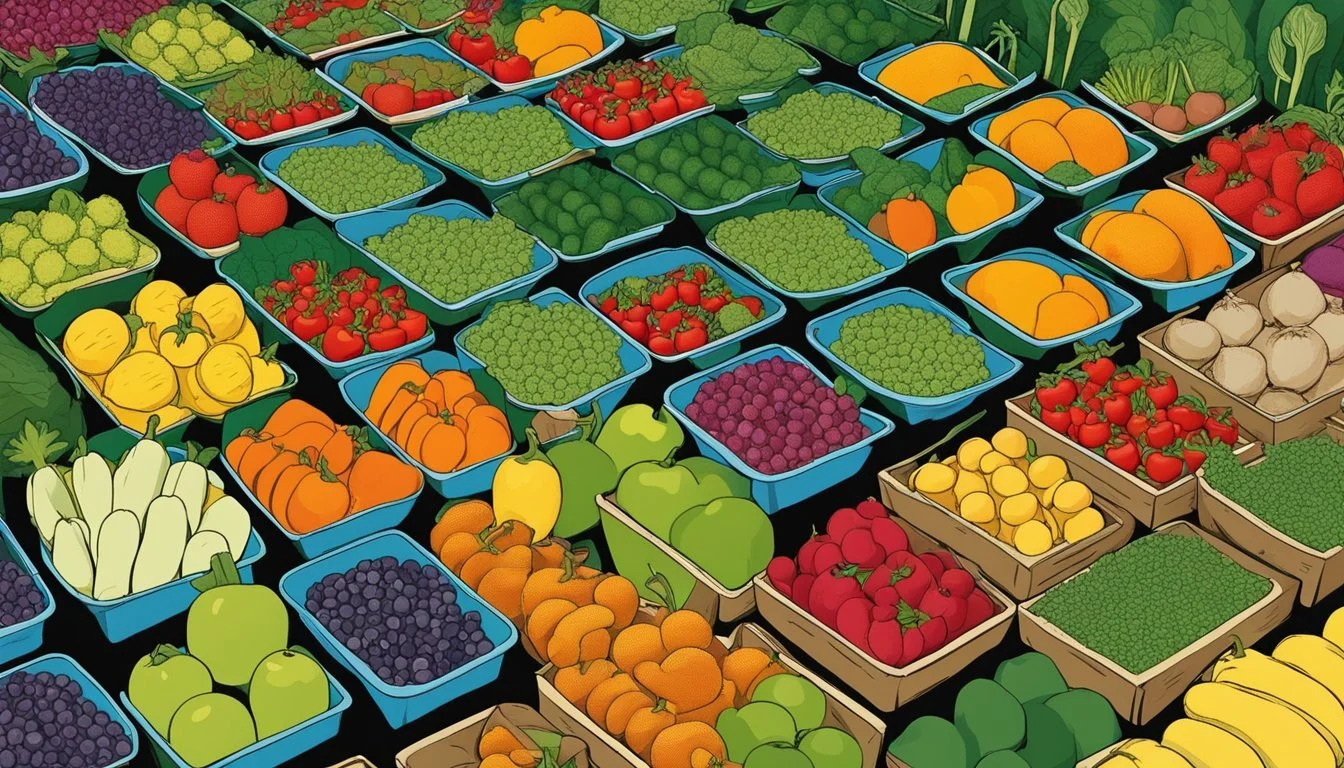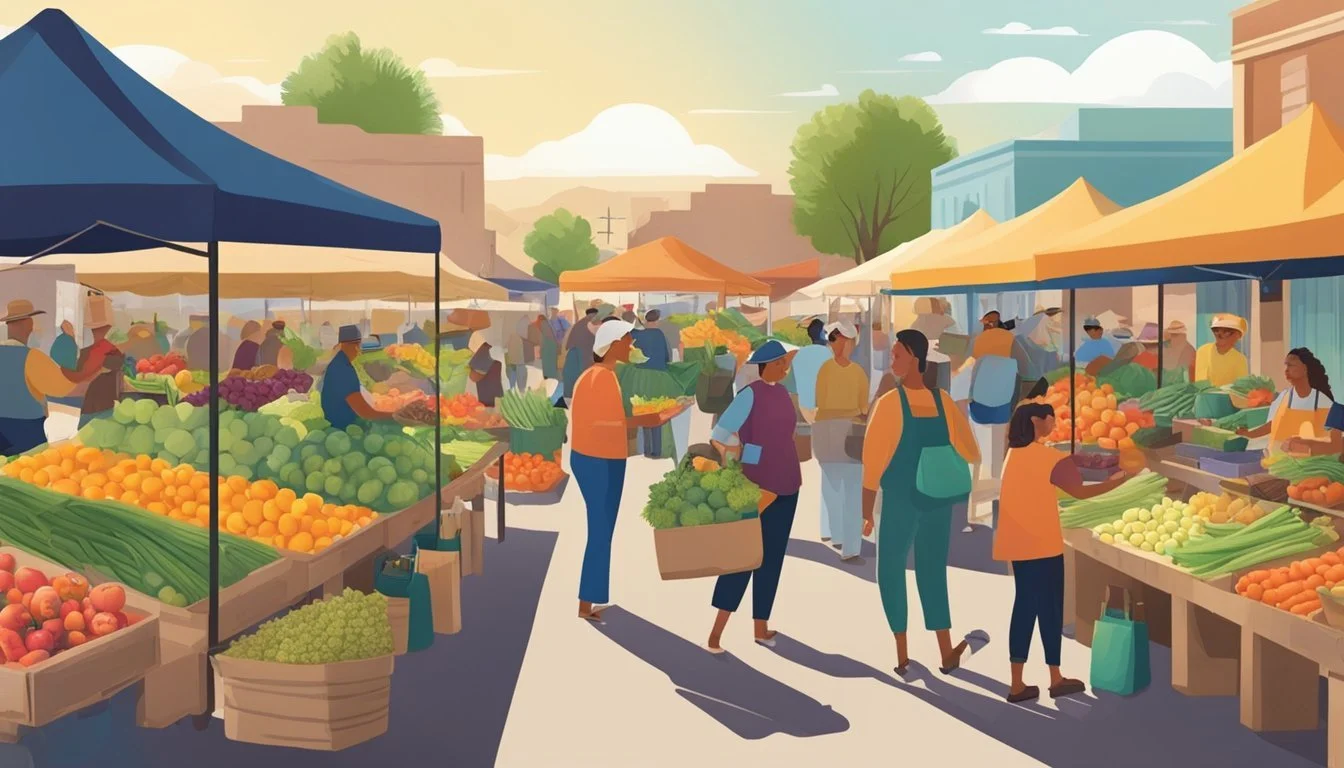Community Supported Agriculture (CSA) in Tucson, AZ
A Guide to Local Farm Shares
Community Supported Agriculture, commonly known as CSA, has taken root in Tucson, AZ, offering residents an opportunity to engage directly with local food systems. Through CSA programs, Tucson consumers support nearby farmers by purchasing seasonal produce shares in advance. This model cultivates a relationship between consumers and producers, fostering a community invested in sustainable agriculture and the benefits it brings to the local economy and environment.
Tucson CSA, among others in the area, exemplifies the spirit of these programs. Members who subscribe receive a weekly assortment of fresh fruits and vegetables, with the possibility of adding other locally produced goods like bread, goat cheese, sprouts, and mushrooms. Beyond the tangible goods, CSAs in Tucson also promote education about where food comes from, how it is grown, and the importance of supporting sustainable practices.
This direct connection bolsters the resilience of local farmers, who benefit from a reliable market for their products while also managing the inherent risks of agriculture. The advance funding provided by CSA members enables farmers to plan their crop rotations more effectively, thereby ensuring a diverse and vibrant selection of produce throughout the growing season. As a result, Tucson's CSA model demonstrates a viable blueprint for supporting and maintaining sustainable local food systems.
History of CSA in Tucson
Community Supported Agriculture in Tucson has a robust story, rooted in the collaboration of local farmers and the community, with growth hinging on a strong spirit of support that started in the early 2000s.
Founding and Growth
The journey of Tucson's CSA program began when Philippe Waterinckx became inspired during a graduate research project at the University of Arizona in 2004. This encounter, along with the collaboration with Daniela Diamente, led to the establishment of the Tucson CSA. Their mission was clear: to make local organic produce more accessible to the residents of Tucson. It was their conviction that connecting with local farmers like Frank of Crooked Sky Farms was imperative. The idea was simple yet powerful—members of the community would pledge upfront support in exchange for a share of the harvest. This model of mutual commitment and shared risks rapidly gained traction and has since nurtured the growth of CSAs in the region.
Impact on Local Farming
The introduction of CSA models in Tucson has had a marked effect on local farming sustainability. By rallying community support and providing financial stability for local farmers, CSAs underpin the viability of small-scale agriculture in the area. Direct community support for farmers mitigates risks associated with food production, allowing them to focus on sustainable farming practices. Over time, these CSAs have facilitated a move towards more responsible agricultural techniques, reinforcing a relationship where the consumer and the producer both share the benefits and responsibilities. The thriving CSA landscape in Tucson continues to foster a committed partnership between consumers and those who grow their food.
How CSA Works
In Tucson, Arizona, Community Supported Agriculture (CSA) is a model that facilitates a direct partnership between consumers and local farms. Through this model, members receive regular shares of the farm's harvest, contributing to a sustainable, community-oriented food system.
Membership and Shares
Members of a Tucson CSA make a commitment by purchasing shares ahead of the growing season, thus providing the farm with upfront capital. Shares typically come in various durations such as 6 or 12-week cycles and are non-refundable, as they represent the member's investment in both the product and the practice of sustainable agriculture. This advance payment approach allows farmers to plan and fund their operations without the strict reliance on traditional market models.
Seasonal Produce Cycles
Tucson CSA operates on the principle of seasonal produce cycles. The content of shares depends on what is currently in season, which means members can expect a variety of vegetables and fruits throughout the year. Shares vary week-to-week and are influenced by local climate conditions and crop yields. This cycle ensures that the produce members receive is fresh and at its peak in both flavor and nutritional value.
Community and Farmer Engagement
The relationship between the CSA members and farmers is founded on mutual support and engagement. Members share in the risks of farming, such as weather and pest conditions, and, in turn, they directly engage with where and how their food is grown. This engagement fosters a strong community bond and encourages sustainable food practices by supporting local producers who utilize natural growing methods. Additionally, programs like Tucson CSA may offer options for using SNAP benefits to make this model more accessible to a wider array of community members.
Benefits of Joining a CSA
Joining a Community Supported Agriculture (CSA) program in Tucson provides a wealth of benefits ranging from improved personal health to economic and environmental advantages. Members enjoy fresh, locally-sourced produce often with organic farming practices.
Health Advantages
Local produce is a cornerstone of CSA programs, offering a diverse array of fresh fruits and vegetables. This produce often reaches consumers within 24 hours of harvest, ensuring peak nutrition and flavor. Access to such fresh, nutrient-dense food can improve one's diet and overall health.
Economic Benefits
By purchasing a CSA share, members commit to supporting local farmers financially. This model provides growers with up-front capital to cover initial season costs, creating a stable economic environment. Consumers benefit from cost savings, as paying for an entire season’s worth of produce upfront typically reduces the overall expense compared to retail pricing.
Environmental Impact
CSAs in Tucson emphasize sustainable farming techniques that have a lesser impact on the environment. Reduced transportation distances from farm to table diminish carbon emissions. Moreover, many CSAs utilize organic methods, minimizing the reliance on synthetic fertilizers and pesticides, which is beneficial for preserving local ecosystems.
Local CSA Farms
Community Supported Agriculture in Tucson connects consumers with fresh, locally-sourced produce while supporting the sustainability of local farms. These farms offer a diverse variety of produce, fostering a strong relationship between the land and the community.
Sleeping Frog Farms Profile
Sleeping Frog Farms is an intensive 75-acre operation dedicated to sustainable farming. They grow an assorted range of vegetables, fruits, and herbs. Their CSA program allows members to receive weekly distributions of their fresh, organically cultivated produce, directly supporting the farm's ongoing commitment to ecological stewardship.
Tucson CSA Overview
Tucson CSA stands out by offering two subscription options: a 6-week or a 12-week non-refundable subscription, emphasizing flexibility for its members. Participants can expect a weekly selection of 7-8 varieties of vegetables and fruits, including options for local meats and artisan breads. This program, by inviting members to prepay for their share, creates a direct link between Tucson residents and local farmers.
Other Notable Farms
Tucson's CSA scene is rich with variety, and several other farms make their mark:
River Road Gardens offers organic seasonal produce with an emphasis on building soil health.
Walking J Farm maintains organic practices and provides a range of vegetables alongside chicken and duck eggs.
These farms contribute to a robust and resilient local food system, cementing the area's commitment to supporting local producers and sustainable agriculture.
CSA Products and Offerings
Community Supported Agriculture in Tucson, AZ, offers an array of fresh produce and locally-sourced products. Through seasonal subscriptions, members receive a variety of items that support local farmers and producers directly.
Vegetable and Fruit Variety
Subscribers to Tucson's CSA programs can expect to receive 7-8 different varieties of fruits and vegetables weekly. These typically include a diverse selection of seasonal greens, root vegetables, and fruits. The produce is chosen by the farmers to ensure freshness and to reflect the season's bounty.
Meat and Dairy Options
The CSA offerings also extend to animal products. Members have the option to add local meat such as pork and beef to their subscriptions. Fresh eggs and goat cheese are also available, providing customers with high-quality, locally-produced dairy options.
Specialty Items
In addition to staples, Tucson CSA provides a range of specialty items. This includes a selection of freshly baked bread, along with other artisanal goods. Local honey is often featured as a sweet treat and as a testament to the diverse agricultural offerings of the region. The availability of these specialty items may vary, but they contribute to the rich variety that supports local production and offers unique options for the subscribers.
Supporting Local Agriculture
Engaging with Community Supported Agriculture (CSA) programs enables community members to directly support local farmers and producers. These partnerships are essential in fostering a resilient and accessible local food system in Tucson, AZ.
Building Relationships with Farmers
CSA members have the unique opportunity to build personal relationships with the people who grow their food. By visiting pickup locations, such as the courtyard of The Historic Y in Tucson, members can often meet the farmers or representatives from the farms. This interaction facilitates a deeper understanding of the agricultural process and engages consumers directly with the stewardship of the land.
Mutual Support and Risks
CSAs embody the principle of mutual support. Consumers pre-pay for seasonal produce, providing the farmers with a reliable source of income and reducing the financial risks often associated with farming. In return, members receive a share of the harvest, which typically includes 7-8 varieties of fruits and vegetables, and sometimes other products like bread or cheese. While the variety and abundance of produce may vary week to week and season to season, the community's investment in local agriculture underlines a collective commitment to sustainability.
Recipes and Preparation
Community Supported Agriculture in Tucson provides a bounty of fresh, local produce which lends itself superbly to a variety of dishes. Learning to cook with CSA products enables one to fully appreciate the flavors of each season.
Seasonal Recipes
When cooking with CSA products, particularly in Tucson where the climate allows for a broad range of produce, utilizing seasonal recipes ensures that ingredients are at their freshest and flavors are at their peak. For instance:
Spring: Fennel Risotto & Greens makes excellent use of spring fennel, paired with other leafy greens.
Summer: Fresh, ripe Tomato Bruschetta capitalizes on the taste of summer tomatoes.
Fall: A hearty Squash Soup celebrates the squash harvest and is perfect for cooler weather.
Winter: Corn Chowder can warm up the cold days with sweet corn's richness.
Cooking with CSA Products
Tomatoes: Essential for sauces and salads, they can be roasted to intensify their flavor or chopped fresh for salsas.
Corn: Sweet corn can be grilled, boiled, or incorporated into salads and salsas for a sweet crunch.
Squash: Versatile and hearty, squash can be roasted, stuffed, or turned into a comforting soup.
Sprouts: Perfect for adding a nutritious crunch to salads, sandwiches, or as a fresh topping on various dishes.
Cooking with products from Tucson's CSA not only supports local agriculture but also enhances the culinary experience with ultra-fresh ingredients that are sure to inspire a host of delicious dishes.
Community Involvement
Community Supported Agriculture (CSA) in Tucson fosters direct relationships between consumers and producers, encouraging hands-on participation and educational growth.
Volunteering and Events
Local farms affiliated with Tucson CSAs often host events aimed at increasing community involvement where volunteers can actively participate in farm-related activities. These events range from planting days to harvest festivals, creating opportunities for individuals to connect with the land and the origins of their food. They serve as a practical illustration of the community's dedication to sustainable agricultural practices and a healthy lifestyle.
Educational Resources
Tucson's CSA programs also prioritize education, offering resources and workshops aimed at increasing consumers' understanding of sustainable farming practices and the importance of supporting local agriculture. By disseminating knowledge about where and how their food is grown, Tucson CSA empowers community members with the information needed to make informed decisions about their food consumption and its impact on the environment.
Challenges and Considerations
Community Supported Agriculture in Tucson, AZ, must navigate the complexities of crop distribution and adapt to fluctuations in food production. These challenges require strategic planning and collaboration to maintain a sustainable model for both producers and consumers.
Overcoming Distribution Challenges
In Tucson, CSA programs must establish efficient distribution systems to ensure that members receive fresh produce regularly. The geography and climate of the Tucson area can pose logistical issues, especially during peak harvesting seasons. Farmers may need to invest in refrigerated storage or consider partnerships with local businesses to use as pick-up locations to keep the produce fresh until it reaches consumers.
Methods to improve distribution:
Local delivery networks
Collaboration with other CSAs for resource pooling
Membership education on pick-up protocols to reduce congestion
Addressing Produce Surplus and Shortage
The imbalance of produce surplus and shortage is a significant concern for Tucson CSAs. Factors such as unpredictable weather can lead to excess or insufficient crop yields. Farmers must be adept at crop planning and consider planting a variety of crops that mature at different times to ensure a steady supply of produce throughout the season.
Strategies to handle fluctuations:
Supply diversification: planting crops with staggered harvesting times
Community engagement: involving members in gleaning and food preservation during times of surplus
Donation programs: partnering with local food banks to distribute extra produce, thereby supporting the wider community
Future of CSA in Tucson
Community Supported Agriculture in Tucson is poised to advance through the adoption of innovative farming techniques and the broadening of its traditional model. These developments aim to bolster partnerships, make efficient use of farmland, and enhance profit sustainability for local farmers.
Innovation in Farming Practices
Tucson's CSA programs are progressively adopting advanced farming practices to sustainably utilize farmland and improve crop yields. For instance, water-saving irrigation technologies are crucial in the arid climate, ensuring that farmland is productive while conserving vital water resources. Additionally, the use of companion planting and organic methods are expected to improve soil health and reduce the need for chemical inputs.
Expanding the CSA Model
The expansion of the CSA model in Tucson is geared towards inclusive growth and profitability. By forming strategic partnerships with institutions such as hospitals and schools, CSA programs are expected to secure a steady demand for their produce. Furthermore, a focus on community engagement and education helps to solidify the consumer-producer relationship, ensuring that consumers understand the value of supporting local agriculture. This symbiosis could result in a more stable profit-revenue stream for farmers, fostering a resilient local food economy.
Resources and Contact Information
Finding and connecting with Local CSA Directories and farms in Tucson is straightforward thanks to a wealth of available resources. This section provides precise contact details and avenues for individuals to engage with local agriculture.
Local CSA Directories
To locate a comprehensive list of CSA programs within Tucson, individuals can refer to local grocery stores and farmers markets, which often have directories for CSAs. Additionally, local food-oriented websites and community boards are valuable resources. These directories typically list various CSA programs, including contact information, allowing consumers to easily find and choose a CSA that best fits their needs.
Contact Details for Farms
For those wishing to connect directly with farms offering CSA programs in Tucson, the contact details are as follows:
Tucson CSA
Website: Tucson CSA
Address: Tucson, AZ 85705 (In the courtyard of The Historic Y)
Contacts:Email: Available on the website
Social Media: Instagram, YouTube
Pickup Information: Details available on the website
Crooked Sky Farms (Supplier for Tucson CSA)
Website: Crooked Sky Farms
Contact information for Crooked Sky Farms can be obtained through Tucson CSA's contact channels, as they have a partnership.
For additional information on specific CSA offerings, such as subscription details or weekly harvest projections, interested community members should contact the CSAs directly through the provided channels or visit their respective websites.
Testimonials and Stories
Community-Supported Agriculture (CSA) has a significant impact on individuals and the community in Tucson, AZ. These stories and testimonials reflect the experiences of both members and farmers, revealing the mutual benefits and commitments that CSAs foster.
Member Experiences
Members of Tucson CSA find value and satisfaction in their participation. For instance, one member, Shelby Thompson, attests to the freshness and quality of the produce she receives weekly.
Shelby Thompson: "Receiving my share of vibrant, seasonal produce every week has transformed my cooking and eating habits for the better."
A consistent theme among members is the deep appreciation for sustainable agriculture practices that contribute to the health of the local environment.
Farmer Insights
Farmers involved in Tucson's CSA programs report a strong sense of community support. Their dedication to cultivating a wide range of crops reflects the community's value for diversity and sustainability.
Dana Helfer and Paul Buseck (Rattlebox Farm): Farmers at Rattlebox Farm highlight their sustainable practices and the conservation-minded approach they use, which has been well received by members.
Overall, the partnership between CSA members and farmers in Tucson is characterized by a shared commitment to sustainability and community nourishment.


